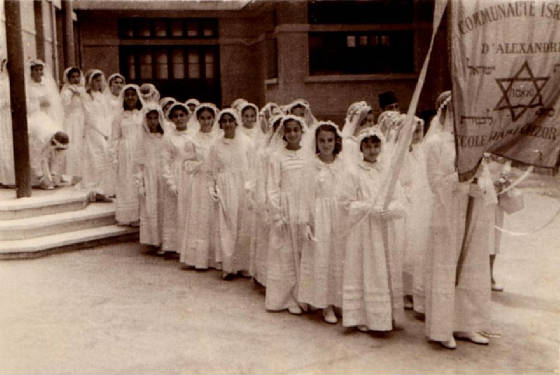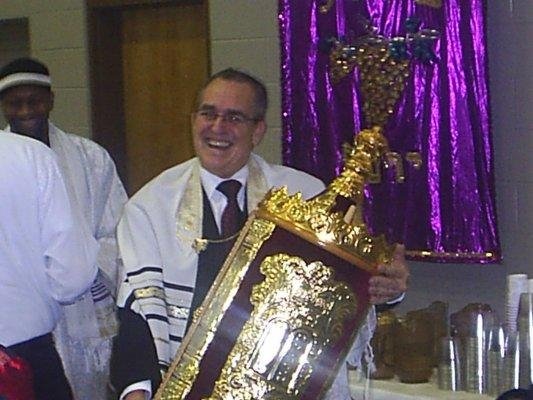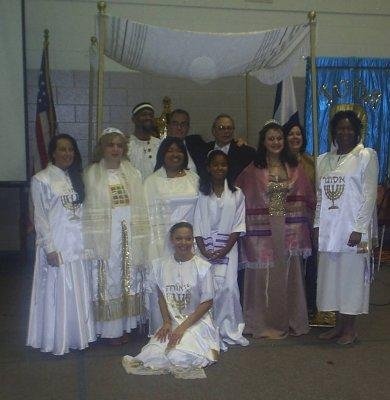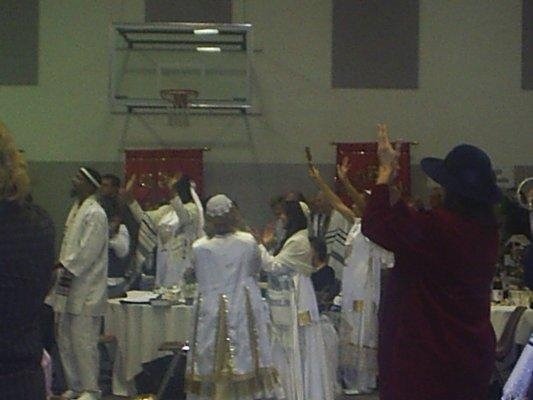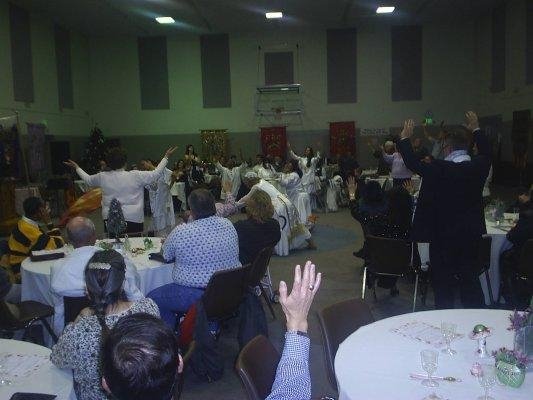Well I
had a bar mitzvah
when I was thirteen,
The greatest bar mitzvah
that you’ve ever seen.
The temple
on the corner
of Mayfield and Lee
was filled with my friends and my family,
all of them proud as proud could
be,
with catering far as the eye could see—
complete with a chopped liver statue of me!1
Bar mitzvah. Many of us had one—many of us are now planning one! Yet there are varying opinions in the messianic Jewish community as to how relevant a bar or bat 2 mitzvah is for believers in Yeshua. Let me offer a few thoughts on the subject as well as a few reflections that some of our Mishpochah Message readers contributed. First, a little background:
A potential bar mitzvah or son of the commandment” is a Jew who has reached the age of accountability. He is responsible to keep God’s commands, answerable for his own behavior and liable for the consequences of that behavior. Theoretically, he is recognized as a full member of the community, and thus the community joins to celebrate that rite of passage.
Whereas the Bible indicates that one was counted as a man at age twenty, 3 the Talmud gives thirteen 4 as the age of accountability in religious matters. The origin of the bar mitzvah celebration is not biblical, and the earliest known institutionalization or celebration of this event was in the thirteenth century.
However, the roots of the bar mitzvah go back to the day of the second Temple. 5 Some say that two thousand years ago, the bar mitzvah boy would be brought to the Temple courtyard to receive the priests’ and elders’ blessings. We can only speculate, but perhaps the New Testament accounts of twelve-year-old Jesus in the Temple were included to show us that he passed through the traditional Jewish rites of his day.
In this case Jesus not only received blessing, but He was also a blessing to all who heard. Whether or not Jesus actually became bar mitzvah, we know that His relationship to the Law was perfect in every way.
Today for some Jewish believers the questions remain: Should messianic Jews maintain the tradition of bar mitzvah? Are we sending a signal that our relationship with God is based on anything other than our faith in Jesus? Are we putting ourselves back under a burden that Scripture says has been lifted from us in the completed work of Calvary?
This isn’t an article on our relationship to Torah, and though I won’t answer that question in depth, I will affirm that salvation is to be found in Yeshua alone. However, as believers let us remember that Yeshua told us: “If you love me, keep My commandments” and “He who has My commandments and keeps them, it is he who loves Me” (John 14:15, 21). Perhaps if enough readers indicate interest, we can have a future article on what Jesus meant by His commandments. Meanwhile, I think we can rejoice to call our children (and ourselves!) sons and daughters of the commandment.
I know that some in the mishpochah have a different, messianic term for this life-cycle event, one that they feel is more accurate or meaningful for Jewish believers. I do not fault them. Personally, I prefer the traditional term. I prefer forms and terms that are familiar as long as they neither undermine our faith in Messiah nor mislead others by implication (for example I would not refer to a special thirteenth birthday party as a bar mitzvah…more to come on that).
By now you’ve probably guessed my stand. In my opinion we are not biblically or morally obligated to see that our children are bar mitzvah. However, I am very much in favor of maintaining this tradition in the Jewish believing community because it is significant. The word significant comes from sign; that is, something that makes a statement, conveys meaning. I can think of four ways that a bar mitzvah is a sign.
Bar mitzvah is a sign to the child that he is a Jew. As children grow, their identity grows too. They learn who they are by observing their parents and others around them. There comes a time when they begin to assert themselves. They begin striving to attain what is important to them. And as they exert themselves to reach certain goals, attaining those goals becomes part of who they are. If we want our children to understand what it means to be a Jew and to live as a Jew, it’s important that we participate in the forms that mark our culture as Jewish. By helping our children take the necessary steps to become bar mitzvah, we will not only teach them but also help them to extend themselves to accomplish something that will give them ownership of their Jewish identity.
I have heard over and over again from many of you that after coming to faith in Messiah, your own Jewishness took on a new importance to you. What better way to express this added appreciation for your Jewishness than by passing along some yiddishkeit to your children? Holidays and life-cycle events serve as landmarks to remind us and our children that as Jews who are Christians, our lives should reflect God’s ownership in a unique way.
Peter and Laura Gittlen wrote of their oldest son, Seth: “His bar mitzvah made him realize his obligation as a Jewish young man to be spiritually responsible. It was a significant coming of age for him, and this ancient tradition connected him to his heritage.”
Bar mitzvah is a sign to the Jewish community that we are Jews. I smiled when I saw Paul and Enid Kaplan’s letter in which they recalled, “From the moment our son, Jacob, was born (well, at least circumcised!) both sets of grandparents, knowing we planned to teach him about Yeshua, wanted to know if we intended him to have a bar mitzvah when he turned thirteen!”
Life-cycle events are significant to our families. When we, as believers in Jesus, continue to regard them as significant, we reassure family and friends that we value our common heritage.
Circumcisions, naming ceremonies, bar mitzvah services, weddings and funerals—all of these are times for Jews to affirm that we are a distinct people. Most of us developed our Jewish identity as family and friends (and less friendly classmates and strangers!) taught us that to be a Jew meant to be different. Yet many of our unbelieving family and friends went through the motions of the Jewish religion without much reference to God. Perhaps that is why some Jewish believers have shied away from rituals, viewing them as perfunctory and void of spiritual meaning. Nevertheless the blessings, prayers and many traditions are very meaningful when we engage our hearts and minds to use them as occasions to meet God in worship. Unbelieving family and friends are often moved as ritual prayers and traditions set a tone that is not only worshipful but also distinctly Jewish.
Let’s provide opportunities for our sons and daughters to identify themselves as Jews, realizing that as we build such opportunities into their lives, we also identify ourselves as Jews. A bar mitzvah can be a wonderful demonstration to family and friends that faith in Jesus is not about cultural assimilation.
Bar mitzvah signals everyone that a child is growing up. True, there are other signs, bar mitzvah or no bar mitzvah! Boys are no longer mistaken for their mothers on the telephone. Girls begin to look like young women. Thirteen-year-olds begin to think about life’s big questions and can understand another’s point of view. Their ability to reason and analyze puts them on the road to independence. Yet it seems like many aspects of their lives are beyond their control, subject to the decisions and actions of adults. The opinions of their peers also weigh heavily upon them.
A thirteen-year-old is likely to feel too old to be a child but too awkward, inexperienced and dependent to be an adult. Many of us recall how trying it was to be thirteen! Yet with all the turmoil and all the changes, we should remember that teens can read the Scriptures with understanding. As they face the challenges of obeying the Lord despite pressure to “follow the crowd,” their faith becomes more their own.
Accountability is an important aspect of maturity. It is helpful to have a landmark event, a rite of passage, to memorialize the fact that young adults must take responsibility for their actions. The bar mitzvah tradition declares before family and friends that young persons are coming into their own. While we do not abandon thirteen-year-olds to make every decision alone, we encourage them to draw upon their knowledge of Scripture and their relationship with the Lord as they face challenging situations.
Boys and girls need and deserve respect before they are thirteen, but this “coming of age” ritual gives them the opportunity to present themselves as responsible members of the community. It gives the community the opportunity to recognize and affirm them as such. The Gittlens wrote of their youngest child, Jerusha, that “her bat mitzvah was the first time she had really done serious Bible study on her own.” The bar mitzvah ceremony is the Jewish time to recognize that a child is growing up.
Bar mitzvah can be a sign to unbelievers that Jesus is the Messiah. Family and friends may hesitate to visit your congregation, but few will want to miss the bar mitzvah of a loved one. This creates a wonderful opportunity for unbelieving family and friends to hear the gospel in a Jewish context. Because it is a core life-cycle event, most will be willing to attend—and with a great deal of curiosity! Listen to this comment from Caren Buffum:
There was not one hostile response from our guests, but rather, we received some remarkable comments such as “If we had a synagogue like this near us, I would definitely go.” (This from an unsaved friend of my parents.) One of my parents’ friends wrote us that she had told her rabbi (not messianic) about our synagogue and how many people came out for services. His response was that maybe they should try singing and dancing at their services like us!
Another woman who might prefer to remain anonymous wrote, “My husband, who is not a regular congregation attendee, was visibly moved by the experience. In a wonderful way, it bonded our family closer together.”
My son Ricardito (my husband is from Central America) had a messianic bar mitzvah at the congregation we attend, associated with Chosen People Ministries. My parents, who don’t attend synagogue, still talk about it and have shown the video ad nauseam to friends and relatives. It has clear evangelistic story.
Many young people choose to give a word of story in their speech. Can you see the potential for a strong story of Yeshua by our younger generation in their bar mitzvah celebrations?
In addition to addressing the significance of a messianic bar mitzvah, I think we need to examine how the event relates to our spirituality as messianic Jews.
God chose and promised to preserve the Jewish people. Bar mitzvah deals with God’s faithfulness in the continuation of the Jewish people—which makes it an occasion to praise and exalt the One who is faithful to His covenant. And because bar mitzvah celebrates the Torah, as we see it handed down from generation to generation, God’s Word has a central role in the service. But as with any of our services, Jesus should always be the center of our worship and attention. He is the Holy One of Israel who beckons young and old to come and follow.
Another consideration is the interplay between this life-cycle event and the child’s relationship with God. Becoming bar mitzvah is not merely knowing how to pray in synagogue. We must do all we can to guide our children, to work and pray that they will become strong in the Lord and look to His Word for guidance. Yet God does not guarantee that when the time comes for a bar mitzvah, our children will be faithfully following Him. We do have one guarantee though: we have an opportunity to talk with our sons and daughters at this important juncture. Why not seize the opportunity and prayerfully use it as best we can? It’s an opportunity that can deepen our children’s understanding of their faith and of the choices that lie ahead.
Some think that if a child has made a profession of faith in Yeshua but has not yet been baptized, then this is the best time for them to take that step. But whereas bar mitzvah speaks of identifying with the Jewish people, baptism speaks of identifying with Yeshua. Therefore I don’t think that baptism should be a prerequisite for bar mitzvah. I would rather see young people baptized at their own request when they demonstrate a good understanding of their faith and a willingness to stand despite the cost. For some this may occur before the age of bar mitzvah. For others it may occur later, when times of trial and pressure demonstrate the reality of their faith.
Now What?
Maybe you desire a bar mitzvah celebration for your child but wonder how to go about it as a Jewish believer in Jesus. There is a balance to maintain. On the one hand, we cannot expect unbelieving rabbis to approve of a messianic bar mitzvah. Nor can we plan our services according to what is acceptable to them, for to do so, we would have to leave out Jesus. Whatever differences we may have as Jewish believers, I trust we agree that Yeshua should be exalted at any of our life-cycle events. Therefore, we will be unable to seek the rabbis’ stamp of approval for messianic bar mitzvahs. Yet for our own integrity, we should maintain certain guidelines so that our bar mitzvahs are really bar mitzvahs! Of course, in the Lord we can do what we want; if you choose simply to organize a praise service, prayerfully lay hands on the young person and have him give a word of story, that is fine—but it is best not to refer to it as a bar mitzvah.
If we want our young people to have something in common with their cousins and with countless Jewish generations, we need to set standards when it comes to a messianic bar mitzvah. Let me suggest that at the very least the young person should learn the Hebrew alephbet and be able to read the language aloud. He or she should be able to recite the Hebrew blessings before and after the Scripture readings and should be able to read a small Bible portion in Hebrew. Optimally (though this is the next level up), the child could translate and comment upon the portion, demonstrating understanding of the passage. For the reception (if there is one) I think the child should be able to recite the kiddush, hamotzi and shehechiyanu.
Those who have prepared children for bar mitzvah tell me that it’s reasonable for most to learn one to two verses per week; three to four months should be ample time to learn the prayers and their portion. (That seems a bit optimistic to me, so don’t feel bad if you and your children need longer.) However, there is more to bar mitzvah preparation than learning to read Hebrew words by rote. It’s an opportunity to actually disciple our children in a structured manner.
We correct or instruct our children as situations arise, but many of us do not systematically invest time in teaching spiritual lessons. Well, if you plan a bar mitzvah and involve yourself in the training, you have a wonderful opportunity to think through what a responsible young Jewish believer in Jesus ought to know—and to involve yourself in teaching those lessons.
Maybe you want to give your child a bar mitzvah, but you aren’t qualified to do the training yourself. You have several options. If you’re part of a messianic congregation, the leaders should be able to train your child and construct a meaningful ceremony. If you don’t belong to a messianic congregation but live near one, many congregation leaders will extend themselves and allow your child to become bar mitzvah during one of their services.
“So,” you’re asking, “what if I live five hundred miles away from the closest messianic congregation and belong to the First Church of Yennevelt? Then what do I do?” Don’t worry, you still have options. One is to host the ceremony in your home. That’s just what Hava ben Joseph and her husband in Claremore, Oklahoma, did. As a way of celebrating the traditional role a woman has in a Jewish home, they held their daughter Bokerah’s bat mitzvah at home, surrounded by family and friends.
Another option for you in Yennevelt is to host the service in your church’s building. Many churches are becoming more sensitive to cultural issues and more excited about the Jewish roots of their faith. If you talk to your pastor about the ceremony and what it means to you, you might find him not merely willing for you to use the building but also eager to help with the ceremony.
In any case, if you need to arrange for a bar mitzvah without the benefit of a messianic leader, you can order what you need through catalog houses. 6 Tell the salesperson your child’s birth date (or the date of the bar mitzvah service) and he will know what Torah and haftorah portion to send you. You might also choose to purchase a Tikkun, a book containing the Torah in two versions: an easy to read version with vowels and, next to it, a reproduction of the more difficult text as it appears in the Torah scroll, without vowels. This enables the child to get the feel of reading from the Torah itself.
Of course, when you call a Jewish catalog house they’ll offer you everything from matchbooks with Stars of David and your child’s name embossed on them to plates with your child’s portrait in the middle (so you can know he’s eating well!). Don’t be swayed; have fun listening, then order what you need.
Remember that when it comes to training, Jewish history and culture also provide opportunities for spiritual insight and interaction. Look for creative ways of imparting lessons. A few suggestions are movies with Jewish themes, Jewish museums, old photo albums and excursions to places that were important to you as you were growing up. You might want to begin this special instruction six months or even a year ahead of time.
When it comes to the party, don’t underestimate the temptation to make a bigger production than necessary to impress (or keep up with) family and friends. We don’t prove how Jewish or how godly we are by partying harder! In planning the event, there are two articles I found helpful in a journal called Kesher, a publication devoted to messianic Jewish issues. 7
In closing, the bar mitzvah says that being Jewish is important. A bar mitzvah says that we have not abandoned our heritage. Though our identity is first and foremost with our Messiah, we also continue to identify with our Jewish people who don’t yet know Him. There are times when the differences between us must be painfully clear. However, these life-cycle events are a time to remember and affirm that we are one people, am echad. A bar mitzvah says to family and the broader Jewish community we still want to be one of you. The Apostle Paul wrote, “Are they Hebrews? So am I. Are they Israelites? So am I. Are they the seed of Abraham? So am I” (2 Corinthians 11:22).
This rite of passage is not merely a statement to the Jewish community. It is a statement to, and a statement from, our children. Speaking of spiritual matters, Paul wrote, “When I was a child, I spoke as a child, I understood as a child, I thought as a child; but when I became a man, I put away childish things” (1Corinthians 13:11). Our hope and prayer is that when our children reach bar mitzvah age they will be ready to assume this call to greater spiritual maturity. May our children truly grow in all ways to become the next generation who want to be known as Jews, and who want to follow the God of our ancestors and His Messiah, Yeshua.
